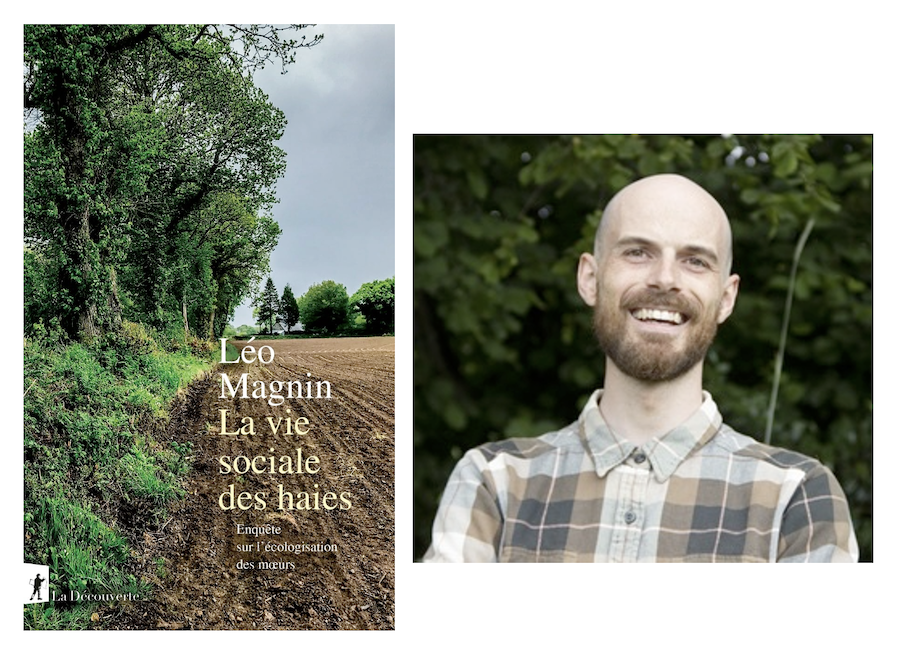The CSI Guests Seminar welcomes
Léo Magnin
to discuss his book
La vie sociale des haies
Enquête sur l’écologisation des mœurs

Introduction to the discussion by Laure Lavigne Delville and Louison Magro
Quatrième de couverture : Tandis que le monde devient de moins en moins habitable, peut-on déceler les indices d’une transformation des manières d’interagir avec l’environnement ? Dans le sillon de Norbert Elias étudiant la civilisation des mœurs à partir du mouchoir, Léo Magnin interroge l’écologisation des mœurs à travers un objet ordinaire : la haie. Car si les arbres et buissons ont une vie biologique bien connue, leur vie sociale mouvementée reste à découvrir.
Massivement détruites lors de la modernisation agricole après 1945, les haies sont désormais plébiscitées en tant que réservoirs de biodiversité, puits de carbone, sources d’énergie renouvelable, freins à l’érosion et trames paysagères. Comment expliquer un tel revirement ? En enquêtant sur les traces de requalifications des haies : l’inquiétude exprimée par un éleveur face à leur protection, les hésitations d’un planteur dans sa parcelle, le coût de l’entretien, le goût de l’élagage, l’étude scientifique du bocage, sa cartographie numérique, son étonnante politisation gouvernementale et villageoise, etc.
Des cours de fermes aux dorures ministérielles, La Vie sociale des haies investigue ainsi les différentes dimensions du processus d’écologisation, dessinant les dynamiques sociales qui s’essoufflent, se poursuivent ou se réinventent à l’épreuve des enjeux environnementaux. Suivre le dédale des haies éclaire les zigzags de l’histoire qui configurent les contradictions de notre présent, mais aussi ses tâtonnements prometteurs…
As the world becomes less habitable, are there signs that we are transforming the way we interact with the environment? Following in the footsteps of Norbert Elias, who studied the civilization of manners through the lens of the handkerchief, Léo Magnin explores the ecologization of manners through an unassuming object: the hedge. For if trees and bushes have a well-known biological life, their eventful social life remains to be discovered.
Hedges were massively destroyed during agricultural modernization after 1945 but are now widely acclaimed as reservoirs of biodiversity, carbon sinks, sources of renewable energy, erosion barriers, and landscape features. What explains such a reversal? Magnin investigates the traces of hedge requalification, such as a farmer’s concern about protection, a planter’s hesitations on his plot, maintenance costs, pruning preferences, scientific hedgerow studies, digital mapping, and the surprising politicization by governments and villagers.
From farmyards to ministerial offices, La Vie sociale des haies (The Social Life of Hedgerows) investigates the various dimensions of the greening process. It outlines the social dynamics that are running out of steam, continuing, or reinventing themselves in the face of environmental challenges. Following the maze of hedgerows sheds light on the twists and turns of history that shape the contradictions of our present, as well as its promising trials and errors.
Léo Magnin is a sociologist and a researcher at the CNRS at LISIS (Interdisciplinary Laboratory for Science, Innovation, and Society). The primary focus of his research is on analyzing the control of greening, addressing how legal categories, thresholds, and indicators are negotiated politically, the unintended effects of environmental monitoring policies, work activities involving digital tools, the phenomena that control techniques allow us to see and not see, as well as the way in which the powers to reward and punish are socially distributed in the agricultural world. He is the author, with Rémi Rouméas and Robin Basier, of Polices environnementales sous contraintes, Éditions Rue D’Ulm, 2024.
Léo Magnin, La vie sociale des haies. Enquête sur l’écologisation des mœurs. La Découverte, 2024.
The Guest Seminar Series is organized collectively by the CSI PhD students. It is open upon registration.

Date: Tuesday November 25, 2025, from 11 a.m. to 1 p.m.
Venue: Room Chevalier. The link will be provided shortly before the seminar
Registration: please fill out this form
Contact: Isaac Bariller and Lauranne Chaignon
Photo source: Léo Magnin, Éditions La Découverte.

